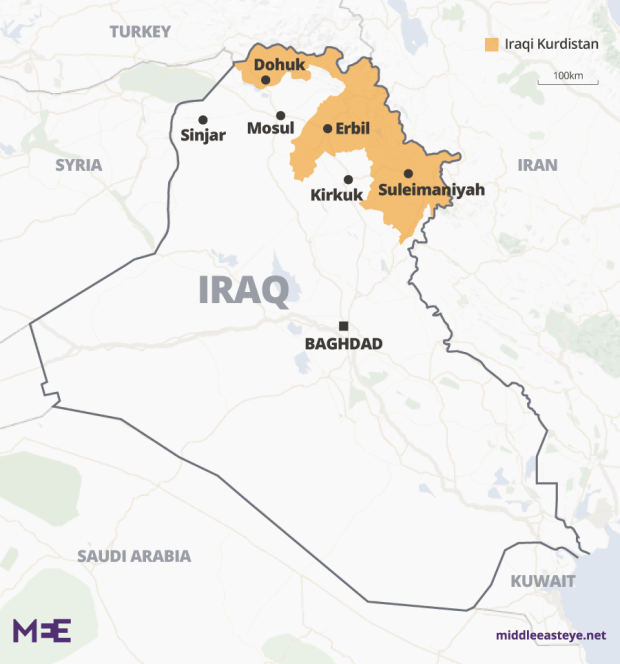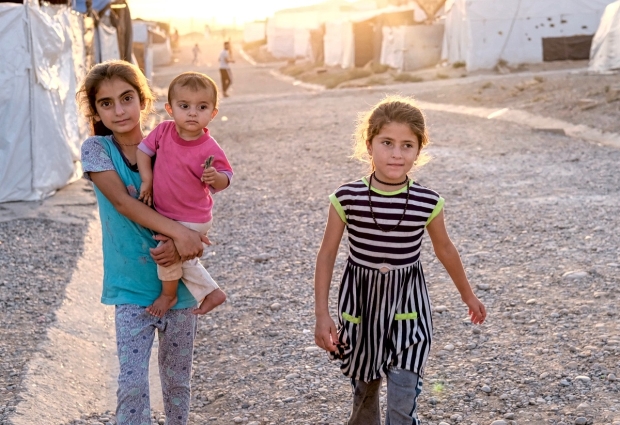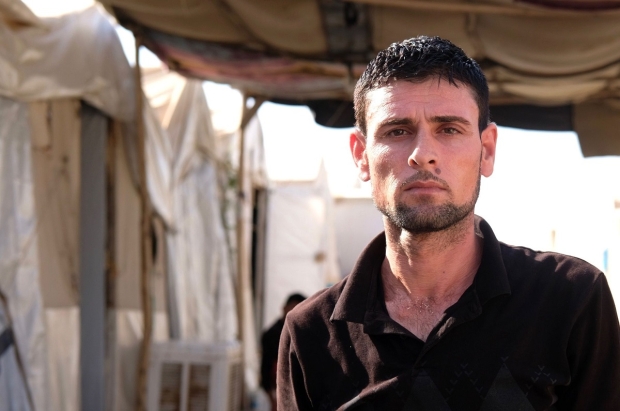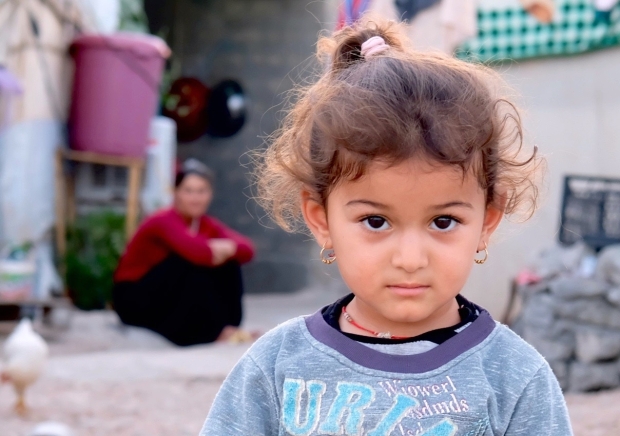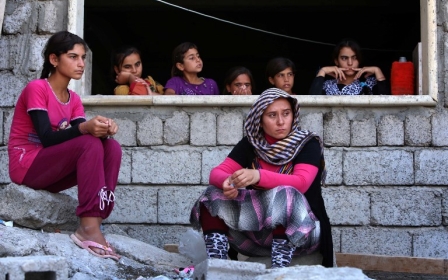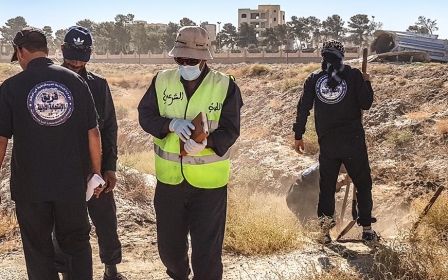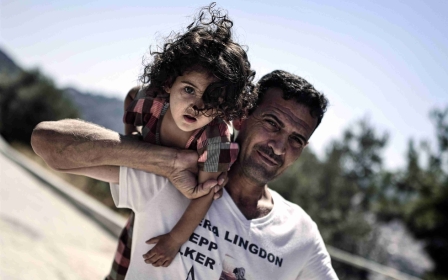Unable to grieve: Iraq's Yazidis trapped in limbo as mass graves left untouched
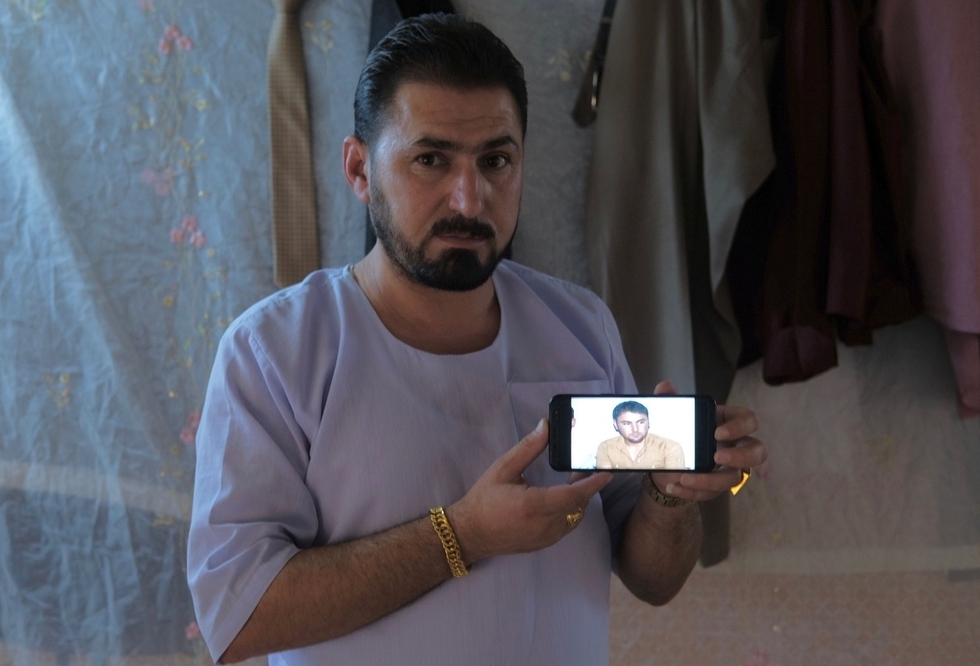
DOHUK, Iraq - Four years after the Islamic State (IS) group took his brother, Tahsin Kheder has given up looking for him.
“Only God knows what happened,” Kheder said, sitting inside his family’s tent in a camp for displaced families in the northern Iraqi city of Dohuk.
In August 2014, IS launched a targeted campaign of violence against the Yazidis, a religious minority living in northern Iraq’s Sinjar. Those who couldn’t escape the rampage were taken captive or executed, their bodies dumped in mass graves.
Kheder fears his younger brother Khairy lies in one of them. But he has no way to be sure - Yazidis are still waiting on the Iraqi government to exhume the mass graves in Sinjar.
“We don't know what to do, whether to search for him in mass graves as a dead person, or to search for him as an alive person,” Kheder said.
The last time Kheder saw his brother was on Mount Sinjar, where they and tens of thousands of other Yazidis had fled to escape the IS fighters attacking their villages. Khairy, then a 25-year-old university student, left the mountain in search of other family members and never returned.
Knowing his brother’s fate, Kheder said, would at least bring his family closure.
“If we know that his body is in the graves, it would be better for us,” Kheder said. “We would not keep thinking of him.”
Changed political landscape
In the four years since the IS advance on Sinjar, the political dynamic has changed considerably in the part of northern Iraq that’s been home to the Yazidis for centuries, leaving this persecuted minority caught in the middle of a deep-rooted rivalry between the Iraqi central government and the Kurds.
Following a failed independence referendum held by the Kurdistan Regional Government (KRG), Iraqi forces took Sinjar from the Kurds in October 2017. The city, along with other disputed territory, had been scooped up by Kurdish forces during the fight against IS.
The recent change in power complicates the effort to locate the missing Yazidis. The majority of survivors are displaced in camps throughout the Kurdistan region of Iraq, but the mass graves themselves are now located in areas under control of the central government.
“I don’t think there is currently the level of cooperation that we would wish to see,” Lena Larsson, head of the Iraq programme at the International Commission on Missing Persons (ICMP), told Middle East Eye.
According to Larsson, part of the problem is that Iraq lacks a centralised system to address missing persons. Instead, multiple government agencies are working on this issue, often duplicating each other’s work.
“Every effort to gather information is lost unless this is coordinated,” Larsson said. “They will never identify the missing if they don’t.”
Lack of cooperation
The challenges the Iraqi government faces in recovering the unaccounted for predates IS. ICMP estimates as many as a million people are missing nationwide, including casualties from decades of sectarian violence and mass slaughter during Saddam Hussein’s brutal rule.
To address its legacy of disappearances, Iraq passed a law in 2006 which outlined procedures for exhuming grave sites. The law, drafted with support from ICMP, requires a committee headed by a judge to oversee excavations in any region where mass graves are found.
Predictably, the KRG and Baghdad disagreed over who should fill that position in Sinjar. In the end, Iraq’s Supreme Judicial Council appointed Ayman Mostafa, the judge who headed the KRG’s own investigative agency, known as Commission for Investigation and Gathering Evidence (CIGE).
Since Mostafa’s appointment in late 2016, not a single one of the 68 mass graves his office has documented in the Sinjar area has been excavated. Mostafa says they are trying, but their hands are tied.
“There is an effort from some people in Baghdad to sideline or marginalise the efforts of the Kurdish government concerning the mass graves,” Mostafa told MEE.
As Mostafa explained, his team of investigators has been banned from entering Sinjar since the October 2017 shift in power. They last tried to access the area in January to put up fencing and warning signs, but he said they were stopped by Iraqi security forces.
“How can we cooperate if we are unable to exist physically in these areas?” Mostafa asked.
“I am sure that these allegations will continue as long as there is a political dimension,” Kareem said.
Kareem, whose department is charged with investigating mass graves at more than 150 locations throughout Iraq, said a lack of resources has prevented the exhumations from moving forward. The Yazidi graves are a massive undertaking, and his department hasn’t received significant funding since 2015.
“I am morally committed to start with these [Yazidi] graves,” Kareem added. “Whether or not it pleases the central or regional government.”
Coping with uncertainty
For many grieving Yazidi families, their ability to move on is being hampered by the uncertainty about what happened to their missing loved ones.
“It’s been four years, but they’re still stuck on that first stage of denial,” said Yesim Arikut-Treece, a psychologist working in Dohuk with the Free Yezidi Foundation, a non-profit that provides counselling and other services to the Yazidi community.
It’s been four years, but they’re still stuck on that first stage of denial
- Yesim Arikut-Treece, psychologist
“I hear that ‘unless I know for certain, unless there’s proof in front of me, I cannot make myself believe that they are gone’,” Arikut-Treece recalled Yazidis saying.
Last October, Dakhel Mahlo was living in Dohuk’s Shariya camp when he received the phone call he had been dreading for three years. A shepherd tending his flock had come across an ID card belonging to Mahlo’s cousin.
“When I heard, I immediately got in the car and drove to Sinjar,” he said.
“These are my father’s shoes,” he said, pulling up a photo on his phone he had taken at the grave site. “This is my brother's wallet.”
Without permission from authorities to take the bodies back, but afraid of what might happen to them if left alone, Mahlo put up fencing himself.
No closure without justice
According to Mostafa, all of the Sinjar grave sites lack basic protection, making them vulnerable to looting and degradation by weather. Experts say neglecting to secure them could make it harder to ensure accountability for IS atrocities.
“Mass grave sites are places with some of the best evidence of [IS] abuse,” said Belkis Wille, senior Iraq researcher at Human Rights Watch.
Mass grave sites are places with some of the best evidence of [IS] abuse
- Belkis Wille, HRW
According to Wille, one of the biggest problems with the current prosecutions of IS suspects in Iraq is that they are almost solely based on confessions, often obtained under torture, rather than evidence.
“These [mass graves] would be the perfect sites for a judiciary that’s actually interested in prosecuting the right individuals using actual scientific evidence,” Wille said.
Iraq’s judges have charged thousands of IS suspects with terrorism, but Wille said she is not aware of a single trial held in Iraq for specific crimes against Yazidis.
That has upset many survivors for whom seeking accountability is a part of the healing process.
“Everyone I speak to ... there isn’t a single person that doesn’t want to see justice done,” Arikut-Treece said.
Officials eye Sinjar excavations
Iraqi officials say the wait may soon be over for families seeking justice, but Kurdish officials are sceptical. In early September, Kareem’s Baghdad staff travelled to Sinjar to collect blood samples from the families of the missing. In October, he said they will begin opening certain graves.
“At least the families can feel a bit of comfort knowing that someone cares, even if it is very late,” Kareem said.
For that very reason, Kareem said his office asked Mostafa to share CIGE’s archive of data. The judge argued it’s not that simple.
“We promised the families we would follow certain standards and procedures,” Mostafa said. “We’d have to make sure the parties we’d hand the data to follow the same standards.”
As of this writing, Mostafa, who is required by federal law to be involved in any Yazidi excavations in Sinjar, said he hadn’t been informed of Baghdad’s plans for exhumations in October.
Moving on after IS
Seated on a mat inside his tent, Kheder flips through photos on his phone taken at Khairy’s wedding taken less than a year before he disappeared.
“He was so handsome,” Kheder says of his younger brother.
While he waits to find out what happened to Khairy, Kheder reflects on the other families who lost loved ones. Nonprofit advocacy group Yazda estimates more than 3,000 Yazidis remain missing despite IS’s defeat in Iraq.
“As Yazidi people, we say that you don't see your pain or your problem as big once you see the pain and problems of others,” Kheder says. “This is what will relieve me of my sadness.”
This article is available in French on Middle East Eye French edition.
New MEE newsletter: Jerusalem Dispatch
Sign up to get the latest insights and analysis on Israel-Palestine, alongside Turkey Unpacked and other MEE newsletters
Middle East Eye delivers independent and unrivalled coverage and analysis of the Middle East, North Africa and beyond. To learn more about republishing this content and the associated fees, please fill out this form. More about MEE can be found here.


